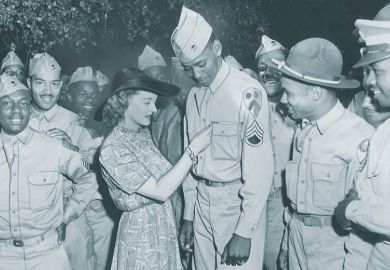It is as it was" is the phrase that Pope John Paul II is said to have uttered after viewing Mel Gibson's film The Passion of the Christ . It is that claim that Adele Reinhartz explores in terms of the whole genre of Jesus movies. Not surprisingly, she concludes that cinema does not represent the Gospels as they are, never mind the historical Jesus. This lack of surprise is the disappointment of the book, for there are interesting questions that could have been developed.
Jesus of Hollywood is a solid work by a capable biblical scholar. In that sense, it is a useful secondary text for courses in theology and film and indeed New Testament interpretation. It includes extensive quoted dialogue from the movies concerned.
One may observe that Reinhartz is very sceptical of the relationship between the Jesus of the Gospels and the Jesus of history, at one point concluding that there are only two "facts" that we can know about Jesus - that he was a Jew and lived under Roman occupation. A number of my New Testament colleagues would be far less sceptical.
To explore the on-screen representations of Jesus of Nazareth, Reinhartz goes through the Gospel characters from Jesus to Pilate, with each chapter structured by looking first at the Gospel presentation and then at cinematic incarnations of that character. She not surprisingly concludes that these characters are presented very differently in different movies. With this rigid method, it is hard to discuss the overall narrative nature of the individual films, although she battles hard to do so.
Reinhartz's inclusion of Monty Python's Life of Brian lightens the text. She explains some of the jokes and reproduces the "What have the Romans done for us?" dialogue though all Jesus scholars should know that by heart.
It would be interesting to push on from this solid base. First, there are now countless examples of the process of making a movie from a written text. For example, it would be interesting to compare the Jesus movie with the Lord of the Rings trilogy. Movies can never represent the written text, but they can enrich the written text. Second, the Jesus movie does not just use the biopic genre of cinema. Crucial in the US context are the western and the superhero genre, which have important things to say in the discussion. Third, The Passion of the Christ gives a new dimension to the Jesus movie. Reinhartz is very snide about this movie on a number of occasions, but she is right to point out its dangers in its portrayal of Jews. However, she does not really pick up on its differences with the Jesus movie tradition and the fact that it was a worldwide phenomenon. She says its popularity was due to its notoriety. It cannot be this simple. Here was a traditional Roman Catholic (Gibson) presenting Jesus in a way that would be attractive to evangelical funders and supporters, focusing simply on the Passion; what's more, as the film critic Mark Kermode has continually emphasised, one cannot fully understand Gibson's portrayal of Jesus outside the genre of horror. From this context, Gibson does some interesting things with the Gospel tradition. Fourth, the book overlooks the hit children's animated series The Storykeepers . This series is important because it is one of the few presentations that takes the oral tradition seriously.
In the movies, it will never "be as it was". I suspect that audiences, film makers and the Pope are quite realistic about this. Reinhartz is far more engaging when speaking about the effect of culture, place and time on the making of the Jesus movie, rather than simply pointing out the fact that the movies do not always present the complexity of characters in the Gospels.
David Wilkinson is principal of St John's College, Durham University.
Jesus of Hollywood
Author - Adele Reinhartz
Publisher - Oxford University Press
Pages - 320
Price - £17.99
ISBN - 9780195146967
Register to continue
Why register?
- Registration is free and only takes a moment
- Once registered, you can read 3 articles a month
- Sign up for our newsletter
Subscribe
Or subscribe for unlimited access to:
- Unlimited access to news, views, insights & reviews
- Digital editions
- Digital access to THE’s university and college rankings analysis
Already registered or a current subscriber? Login



